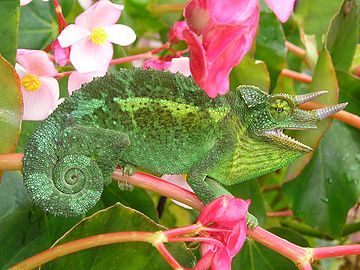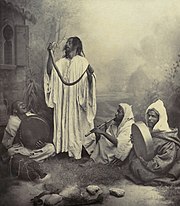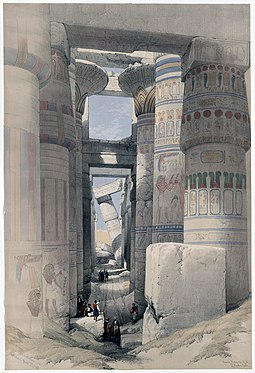Portal:Africa



Africa is the world's second-largest and second-most populous continent after Asia. At about 30.3 million km2 (11.7 million square miles) including adjacent islands, it covers 20% of Earth's land area and 6% of its total surface area. With nearly 1.4 billion people as of 2021, it accounts for about 18% of the world's human population. Africa's population is the youngest among all the continents; the median age in 2012 was 19.7, when the worldwide median age was 30.4. Based on 2024 projections, Africa's population will reach 3.8 billion people by 2099. Africa is the least wealthy inhabited continent per capita and second-least wealthy by total wealth, ahead of Oceania. Scholars have attributed this to different factors including geography, climate, corruption, colonialism, the Cold War, and neocolonialism. Despite this low concentration of wealth, recent economic expansion and a large and young population make Africa an important economic market in the broader global context. Africa has a large quantity of natural resources and food resources, including diamonds, sugar, salt, gold, iron, cobalt, uranium, copper, bauxite, silver, petroleum, natural gas, cocoa beans, and.
Africa straddles the equator and the prime meridian. It is the only continent to stretch from the northern temperate to the southern temperate zones. The majority of the continent and its countries are in the Northern Hemisphere, with a substantial portion and a number of countries in the Southern Hemisphere. Most of the continent lies in the tropics, except for a large part of Western Sahara, Algeria, Libya and Egypt, the northern tip of Mauritania, and the entire territories of Morocco, Ceuta, Melilla, and Tunisia, which in turn are located above the tropic of Cancer, in the northern temperate zone. In the other extreme of the continent, southern Namibia, southern Botswana, great parts of South Africa, the entire territories of Lesotho and Eswatini and the southern tips of Mozambique and Madagascar are located below the tropic of Capricorn, in the southern temperate zone.
Africa is highly biodiverse; it is the continent with the largest number of megafauna species, as it was least affected by the extinction of the Pleistocene megafauna. However, Africa also is heavily affected by a wide range of environmental issues, including desertification, deforestation, water scarcity, and pollution. These entrenched environmental concerns are expected to worsen as climate change impacts Africa. The UN Intergovernmental Panel on Climate Change has identified Africa as the continent most vulnerable to climate change.
The history of Africa is long, complex, and varied, and has often been under-appreciated by the global historical community. In African societies the oral word is revered, and they have generally recorded their history via oral tradition, which has led anthropologists to term them oral civilisations, contrasted with literate civilisations which pride the written word. During the colonial period, oral sources were deprecated by European historians, which gave them the impression Africa had no recorded history. African historiography became organized at the academic level in the mid-20th century, and saw a movement towards utilising oral sources in a multidisciplinary approach, culminating in the General History of Africa, edited by specialists from across the continent. (Full article...)
Selected article –
A civil war between two major rival factions of the military government of Sudan, the Sudanese Armed Forces (SAF) under Abdel Fattah al-Burhan and the paramilitary Rapid Support Forces (RSF) and its allies (collectively the Janjaweed coalition) under the Janjaweed leader Hemedti, began during Ramadan on 15 April 2023. Three minor (neutral) factions have also participated in the fighting: the Darfur Joint Protection Force; the SLM (al-Nur) under Abdul Wahid al-Nur; and the SPLM-N under Abdelaziz al-Hilu. Fighting has been concentrated around the capital city of Khartoum (the largest and initial battle of the war) and the Darfur region. As of 14 November 2024, at least 61,000 people had been killed in Khartoum State alone, of which 26,000 were a direct result of the violence. As of 5 July 2024, over 7.7 million were internally displaced and more than 2.1 million others had fled the country as refugees, and many civilians in Darfur have been reported dead as part of the Masalit massacres.
The war began with attacks by the RSF on government sites as airstrikes, artillery, and gunfire were reported across Sudan. The cities of Khartoum and Omdurman were divided between the two warring factions, with al-Burhan relocating his government to Port Sudan as RSF forces captured most of Khartoum's government buildings. Attempts by international powers to negotiate a ceasefire culminated in the Treaty of Jeddah in May 2023, which failed to stop the fighting and was ultimately abandoned. (Full article...)
Featured pictures –
Did you know (auto-generated) -

- ... that in Africa, the criminalization of homosexuality was a colonial imposition and the decriminalization of homosexuality is resisted as a neocolonial imposition?
- ... that Central City College was established as an African American-led alternative to the historically black Atlanta Baptist College?
- ... that Dominion: An Anthology of Speculative Fiction From Africa and the African Diaspora was partly inspired by The 1619 Project?
- ... that many African countries provide for legal abortion in their reproductive health laws, but such laws have been passed without grounds for legal abortion in Madagascar and in Senegal?
- ... that ten years after publishing the book Great South African Christians, Horton Davies gave a speech criticizing South African churches and synagogues for their role in apartheid?
- ... that opera singer Charles Holland spent much of his career in Europe as opportunities in classical music for African Americans were limited?
Categories
Selected biography –
Evelyn Ntoko Mase (18 May 1922 – 30 April 2004), later named Evelyn Rakeepile, was the first wife of the South African anti-apartheid activist and the future president Nelson Mandela, to whom she was married from 1944 to 1958. Mase was a nurse by profession.
Born in Engcobo, Transkei, Mase was orphaned as a child. She moved to Johannesburg to train as a nurse, and there met and married Mandela. Living together in Soweto, they raised four children, three of whom—Thembekile, Makgatho, and Makaziwe—survived into adulthood. She trained to be a midwife while working as a nurse. In the 1950s, her relationship with Mandela became strained. He was becoming increasingly involved in the African National Congress and its campaign against apartheid; Mase eschewed politics and became a Jehovah's Witness. She also accused him of adultery with several women, an accusation corroborated by later biographies, and of being physically abusive, something he always denied. They separated in 1956. She initially filed for divorce, but did not go through with the legal proceedings. In 1958, Mandela, who was hoping to marry Winnie Madikizela, obtained an uncontested divorce from Mase. (Full article...)
Selected country –
 |
 |
||

| |||
Guinea, officially the Republic of Guinea (French: République de Guinée), is a nation in West Africa, formerly known as French Guinea. It borders Guinea-Bissau and Senegal to the north, Mali to the north and north-east, Côte d'Ivoire to the south-east, Liberia to the south, and Sierra Leone to the south-west. It encompasses the water source of the Niger, Senegal, and Gambia rivers. The name Guinea is used for the region of most of Africa's west coast south of the Sahara desert and north of the Gulf of Guinea. Guinea is sometimes called Guinea-Conakry per its capital, to differentiate it from the neighboring Guinea-Bissau (whose capital is Bissau).
Richly endowed with minerals, Guinea possesses over 25 billion metric tons of bauxite–perhaps up to one half of the world's reserves. In addition, Guinea's mineral wealth includes more than 4 billion tons of high-grade iron ore, significant diamond and gold deposits, and undetermined quantities of uranium. Soil, water, and climatic conditions provide opportunities for large-scale irrigated farming and agro industry. (Read more...)
Selected city –

Suez (/ˈsuː.ɛz/, Egyptian Arabic: السويس, romanized: as-Suways, pronounced [esseˈweːs]) is a seaport city (population of about 700,000 as of August 2021[update]) in north-eastern Egypt, located on the north coast of the Gulf of Suez on the Red Sea, near the southern terminus of the Suez Canal, and is the capital of the Suez Governorate. It has three ports: the Suez Port (Port Tewfik), al-Adabiya, and al-Zaytiya, and extensive port facilities. Together they form a metropolitan area, located mostly in Africa with a small portion in Asia.
Railway lines and highways connect the city with Cairo, Port Said, and Ismailia. Suez has a petrochemical plant, and its oil refineries have pipelines carrying the finished product to Cairo. These are represented in the flag of the governorate: the blue background refers to the sea, the gear refers to Suez's status as an industrial governorate, and the flame refers to the petroleum firms of Suez. (Full article...)
In the news
- 12 February 2024 –
- Two boats collide on the Congo River near Kinshasa, Democratic Republic of the Congo; with the death toll remains unclear. (AP)
- 11 February 2024 – 2023 Africa Cup of Nations
- In association football, hosts Ivory Coast win their third Africa Cup of Nations by defeating Nigeria 2–1 in the final. Sébastien Haller scores the winning goal in the 81st minute. (The Guardian)
- 10 February 2024 – Somali civil war
- Four Emirati soldiers and a Bahraini military officer are killed, while ten other people are injured, when a soldier opens fire at a military base in Mogadishu, Somalia, before being killed in the ensuing shootout. Al-Shabaab claims responsibility. (AP)
- 10 February 2024 –
- A Eurocopter EC130 helicopter crashes near Nipton, California, United States, killing all the six people on board, including Nigerian banker Herbert Wigwe. (CBS News)
- 10 February 2024 – 2023–2024 Senegalese protests
- Violent protests occur in Senegal following an announcement by President Macky Sall that presidential elections have been delayed from February 25 to December 15. (Sky News)
- 9 February 2024 –
- At least 18 people are killed during a collision between a bus and a truck on a road in Kinshasa, Democratic Republic of the Congo. (AP)
Updated: 16:33, 14 February 2024
General images -
Africa topics
More did you know –
- ...that Rukwanzi Island, an island in Lake Albert, one of the African Great Lakes, is the subject of a territorial dispute between the Democratic Republic of the Congo and Uganda?
- ...that Oumarou Sidikou, vice-governor of the Central Bank of West African States from 1988 to 1993, was a minister in the government of Nigerien Prime Minister Hama Amadou, which was ousted by a military coup in 1996?
- ...that Jason Dunford, an All-Africa Games gold medalist and runner-up for the 2006 Kenyan Sportsman of the Year award, has a younger brother who was selected "most promising sportsman" at the same awards?
- ...that Sam Mbakwe, governor of Imo State from 1979 to 1983, served in the army of the Republic of Biafra, an Igbo secessionist state in southeastern Nigeria, during the Nigerian Civil War?
Related portals
Major Religions in Africa
North Africa
West Africa
Central Africa
East Africa
Southern Africa
Associated Wikimedia
The following Wikimedia Foundation sister projects provide more on this subject:
-
Commons
Free media repository -
Wikibooks
Free textbooks and manuals -
Wikidata
Free knowledge base -
Wikinews
Free-content news -
Wikiquote
Collection of quotations -
Wikisource
Free-content library -
Wikispecies
Directory of species -
Wikiversity
Free learning tools -
Wikivoyage
Free travel guide -
Wiktionary
Dictionary and thesaurus























































































